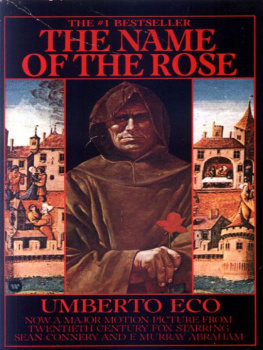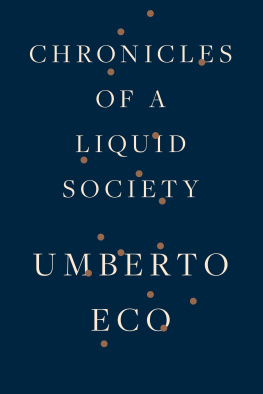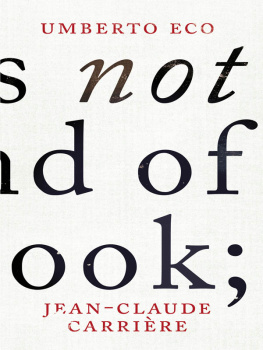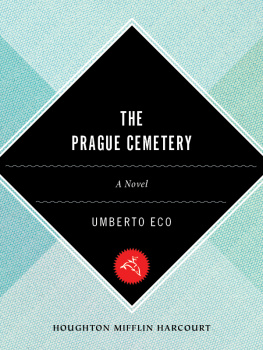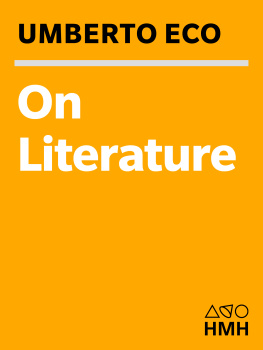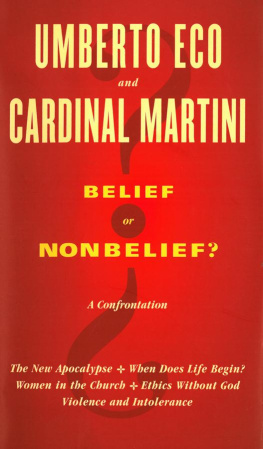Umberto Eco - The Name of the Rose
Here you can read online Umberto Eco - The Name of the Rose full text of the book (entire story) in english for free. Download pdf and epub, get meaning, cover and reviews about this ebook. publisher: Warner Books, genre: Detective and thriller. Description of the work, (preface) as well as reviews are available. Best literature library LitArk.com created for fans of good reading and offers a wide selection of genres:
Romance novel
Science fiction
Adventure
Detective
Science
History
Home and family
Prose
Art
Politics
Computer
Non-fiction
Religion
Business
Children
Humor
Choose a favorite category and find really read worthwhile books. Enjoy immersion in the world of imagination, feel the emotions of the characters or learn something new for yourself, make an fascinating discovery.
- Book:The Name of the Rose
- Author:
- Publisher:Warner Books
- Genre:
- Rating:3 / 5
- Favourites:Add to favourites
- Your mark:
- 60
- 1
- 2
- 3
- 4
- 5
The Name of the Rose: summary, description and annotation
We offer to read an annotation, description, summary or preface (depends on what the author of the book "The Name of the Rose" wrote himself). If you haven't found the necessary information about the book — write in the comments, we will try to find it.
The Name of the Rose — read online for free the complete book (whole text) full work
Below is the text of the book, divided by pages. System saving the place of the last page read, allows you to conveniently read the book "The Name of the Rose" online for free, without having to search again every time where you left off. Put a bookmark, and you can go to the page where you finished reading at any time.
Font size:
Interval:
Bookmark:
In which a sermon is heard about the coming of the Antichrist, and Adso discovers the power of proper names.
Vespers had been sung in a confused fashion while the interrogation of the cellarer was still under way, with the curious novices escaping their masters control to observe through windows and cracks what was going on in the chapter hall. Now the whole community was to pray for the good soul of Severinus. Everyone expected the abbot to speak, and wondered what he would say. But instead, after the ritual homily of Saint Gregory, the responsory, and the three prescribed psalms, the abbot did step into the pulpit, but only to say he would remain silent this evening. Too many calamities had befallen the abbey, he said, to allow even the spiritual father to speak in a tone of reproach and admonition. Everyone, with no exceptions, should now make a strict examination of conscience. But since it was necessary for someone to speak, he suggested the admonition should come from the oldest of their number, now close to death, the brother who was the least involved of all in the terrestrial passions that had generated so many evils. By right of age Alinardo of Grottaferrata should speak, but all knew the fragile condition of the venerable brothers health. Immediately after Alinardo, in the order established by the inevitable progress of time, came Jorge. And the abbot now called upon him.
We heard a murmuring from the section of the stalls where Aymaro and the other Italians usually sat. I suspected the abbot had entrusted the sermon to Jorge without discussing the matter with Alinardo. My master pointed out to me, in a whisper, that the abbots decision not to speak had been wise, because whatever he might have said would have been judged by Bernard and the other Avignonese present. Old Jorge, on the other hand, would confine himself to his usual mystical prophecies, and the Avignonese would not attach much importance to them. But I will, William added, because I dont believe Jorge agreed, and perhaps asked, to speak without a very precise purpose.
Jorge climbed into the pulpit, with someones help. His face was illuminated by the tripod, which alone lighted the nave. The glow of the flame underlined the darkness shrouding his eyes, which seemed two black holes.
Most beloved brothers, he began, and all of our guests, most dear to us. If you care to listen to this poor old man ... The four deaths that have afflicted our abbeynot to mention the sins, remote and recent, of the most abject among the livingare not, as you know, to be attributed to the severity of nature, which, implacable in its rhythms, ordains our earthly day, from cradle to grave. All of you no doubt believe that, though you have been overwhelmed with grief, these sad events have not involved your soul, because all of you, save one, are innocent, and when this one has been punished, while you will, to be sure, continue to mourn the absence of those who have gone, you will not have to clear yourselves of any charge before the tribunal of God. So you believe. Madmen! he shouted in an awful voice. Madmen and presumptuous fools that you are! He who has killed will bear before God the burden of his guilt, but only because he agreed to become the vehicle of the decrees of God. Just as it was necessary for someone to betray Jesus in order for the mystery of redemption to be accomplished, yet the Lord sanctioned damnation and vituperation for the one who betrayed him. Thus someone has sinned in these days, bringing death and ruination, but I say to you that this ruination was, if not desired, at least permitted by God for the humbling of our pride!
He was silent, and turned his blank gaze on the solemn assembly as if his eyes could perceive its emotions, as in fact with his ear he savored the silence and consternation.
In this community, he went on, for some time the serpent of pride has been coiled. But what pride? The pride of power, in a monastery isolated from the world? No, certainly not. The pride of wealth? My brothers, before the known world echoed with long debates about poverty and ownership, from the days of our founder, we, even when we had everything, have never had anything, our one true wealth being the observation of the Rule, prayer, and work. But of our work, the work of our order and in particular the work of this monastery, a partindeed, the substanceis study, and the preservation of knowledge. Preservation of, I say, not search for, because the property of knowledge, as a divine thing, is that it is complete and has been defined since the beginning, in the perfection of the Word which expresses itself to itself. Preservation, I say, and not search, because it is a property of knowledge, as a human thing, that it has been defined and completed over the course of the centuries, from the preaching of the prophets to the interpretation of the fathers of the church. There is no progress, no revolution of ages, in the history of knowledge, but at most a continuous and sublime recapitulation. Human history proceeds with a motion that cannot be arrested, from the creation through the redemption, toward the return of Christ triumphant, who will appear seated on a cloud to judge the quick and the dead; but human and divine knowledge does not follow this path: steady as a fort that does not cede, it allows us, when we are humble and alert to its voice, to follow, to predict this path, but it is not touched by the path. I am He who is, said the God of the Jews. I am the way, the truth, and the life, said our Lord. There you have it: knowledge is nothing but the awed comment on these two truths. Everything else that has been said was uttered by the prophets, by the evangelists, by , the fathers and the doctors, to make these two sayings clearer. And sometimes an apposite comment came also from the pagans, who were ignorant of them, and their words have been taken into the Christian tradition. But beyond that there is nothing further to say. There is only to continue meditation, to gloss, preserve. This was and should be the office of our abbey with its splendid librarynothing else. It is said that an Oriental caliph one day set fire to the library of a famous and glorious and proud city, and that, as those thousands of volumes were burning, he said that they could and should disappear: either they were repeating what the Koran already said, and therefore they were useless, or else they contradicted that book sacred to the infidels, and therefore they were harmful: The doctors of the church, and we along with them, did not reason in this way. Everything that involves commentary and clarification of Scripture must be preserved, because it enhances the glory of the divine writings; what contradicts must not be destroyed, because only if we preserve it can it be contradicted in its turn by those who can do so and are so charged, in the ways and times that the Lord chooses. Hence the responsibility of our order through the centuries, and the burden of our abbey today: proud of the truth we proclaim, humble and prudent in preserving those words hostile to the truth, without allowing ourselves to be soiled by them. Now, my brothers, what is the sin of pride that can tempt a scholar-monk? That of considering as his task not preserving but seeking some information not yet vouchsafed mankind, as if the last word had not already resounded in the words of the last angel who speaks in the last book of Scripture: For I testify unto every man that heareth the words of the prophecy of this book. If any man shall add unto these things, God shall add unto him the plagues that are written in this book: and if any man shall take away from the words of the book of this prophecy, God shall take away his part out of the book of life, and out of the holy city, and from the things which are written in this book. There ... does it not seem to you, my unfortunate brothers, that these words only adumbrate what has recently happened within these walls, whereas what has happened within these walls adumbrates only the same vicissitude as that afflicting the century in which we live, determined in word and in deed, in cities as in castles, in proud universities and cathedral churches, to seek anxiously to discover new codicils to the words of the truth, distorting the meaning of that truth already rich in all the scholia, and requiring only fearless defense and not foolish increment? This is the pride that lurked and is still lurking within these walls: and I say to him who has labored and labors to break the seals of the books that are not his to see, that it is this pride the Lord wanted to punish and will continue to punish if it is not brought down and does not humble itself, for the Lord has no difficulty in finding, always and still, thanks to our fragility, the instruments of His vengeance.
Font size:
Interval:
Bookmark:
Similar books «The Name of the Rose»
Look at similar books to The Name of the Rose. We have selected literature similar in name and meaning in the hope of providing readers with more options to find new, interesting, not yet read works.
Discussion, reviews of the book The Name of the Rose and just readers' own opinions. Leave your comments, write what you think about the work, its meaning or the main characters. Specify what exactly you liked and what you didn't like, and why you think so.

